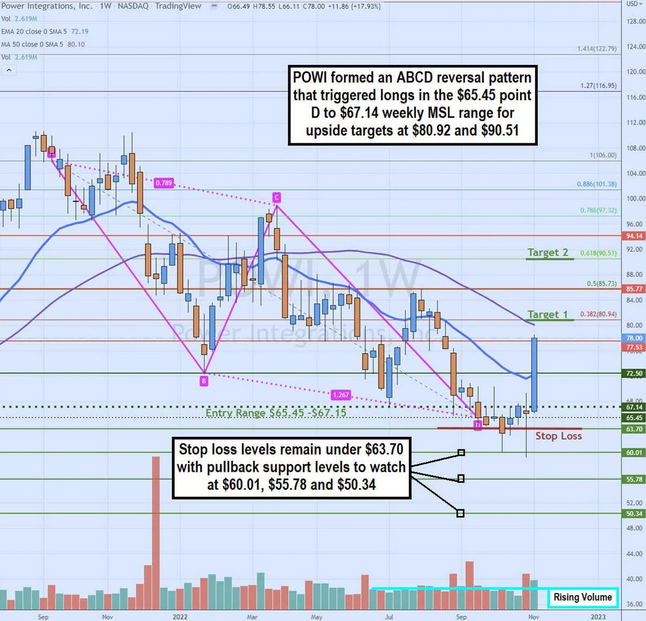- Its proprietary gallium nitride (GaN) transistors are more efficient than legacy silicon transistors
- Power Integrations is a benefactor of clean and renewable power generation as its chips help efficient AC-DC conversion
- The Company has $363 million in cash and authorized a $100 million stock buyback
Power Integrations (NASDAQ:POWI) is a supplier of analog and mixed-signal integrated circuits (IC) and high-performance electronic components for the power supply market. It allows for efficient and compact AC-DC power conversion products for power supply ranging from under one watt up to 500 watts of output.
Its ICs enable for the conversion of high-voltage alternate power (AC) from a wall outlet to low-voltage direct current (DC) used for electronic devices ranging from battery chargers, LED lights, and smartphones to appliances. Its SCALE gate drivers are critical components in high-power systems in electric vehicles (EVs), motors, solar and wind turbines, and DC transmission lines.
Its products are key components in the clean energy ecosystem movement as it enables the generation and transmission of green and renewable energy in applications measured in milliwatts to megawatts. It’s EcoSmart energy efficiency technology saves billions of kilowatt hours from being wasted and its ICs eliminate billions of electronic components in AC-DC power supply, gate drivers, and LEDs.
Direct and Indirect Competitors
The Company faces tough competition from other makers of ICs and power conversion components. This includes Skywater Technology Inc (NASDAQ:SKYT) is a foundry specializing in volume manufacturing of ICs, power, and analog chip supplier ON Semiconductor Corporation (NASDAQ:ON), Diodes (NASDAQ:DIOD), Semtech Corporation (NASDAQ:SMTC), Cirrus Logic (NASDAQ:CRUS), and Silicon Laboratories (NASDAQ:SLAB). Demand has been falling in its consumer segment which accounts for 60% of revenues. The weakness is mainly in appliance sales and expected to continue as a strong U.S. dollar and inflation continue to strain consumer spending.
Deceleration Continues
Power Integrations reported its Q3 2022 earnings on Nov. 2, 2022. The Company reported earnings-per-share (EPS) of $0.84 to beat consensus analyst estimates for $0.85 by $0.01. Revenues continued to drop (-9.4%) year-over-year (YoY) to $160.23 million, falling short of analyst expectations for $164.29 million. The Board of Directors have authorized a $100 share buyback subject to pre-determined price/volume thresholds with no expiration.
More Weakness Expected Ahead
Unfortunately, the Company lowered its guidance for Q4 2022 with revenues coming in between $120 to $130 versus $159.89 consensus analyst estimates. GAAP gross margins are expected between 55.5$ to 56% and GAAP operating expenses are expected between $42 to $42.5 million. Power Integrations CEO Balu Balakrishnan commented,
“Demand has continued to weaken, particularly in appliances and other consumer applications, and inventories have accumulated in the supply chain. While our near-term revenue outlook is therefore muted, we continue to gain market share across a broad set of end markets while making excellent progress on growth initiatives like automotive, motor drive, and our proprietary GaN technology. Our board of directors has committed $100 million to share repurchases, reflecting our strong balance sheet and our high level of confidence in our long-term growth prospects.”
Cowen Cuts Rating to Market Perform
On Nov. 3, 2022, Cowen lowered POWI shares to a Market Perform with a $65 price target. It’s analyst Matthew Ramsay commented,
“POWI has a strong portfolio with GaN quickly gaining traction, but limited visibility into a recovery in consumer-related markets likely caps upside to shares. With our estimates moving down sharply, we believe current valuation appropriately balances the budding growth opportunities with consumer weakness.”

Weekly ABCD Reversal Harmonic (NASDAQ:HLIT) Pattern in Effect
The weekly candlestick chart on POWI indicates an ABCD harmonic bullish reversal pattern. This pattern is comprised of three price swings as indicated on the chart with an initial price fall from point A to point B $106 to $72.50, then a price rise from point B up to point C from $72.50 to $98.92, then a price fall from point C through point D from $98.92 through $65.45 to form a swing low bottom at $59.16 in the last week of October 2022. The ABCD pattern has specific rules when trading. The buy territory is when shares rise through point D which is $65.45. There is also a weekly market structure low (MSL) that triggered the breakout through $67.14.
This caused shares to spike up through the weekly 20-period exponential moving average (EMA) resistance around $72.50 towards is falling weekly 50-period MA resistance at $80.10. There are two upside targets measured by the Fibonacci retracements from point A ($106) to point D (65.45) level. The first target sits at the 32.8% retracement level at $80.94 and the second target sits at the 61.8% retracement level at $90.51. Stop-loss levels remain under point D at the $63.70 level and the $60.01 level. Pullback support levels below that sit at $55.78 and $50.34.
Long-Term Secular Growth Drivers
While the near-term headwinds continue to erode Power Integrations performance, long-term secular growth drivers still exist. It’s gallium-nitride (GaN) technology increases efficiency by expanding dollar content. The transition to clean and renewable energy generation is a direct growth driver. The global movement to reduce carbon emissions is a boon to its business.
Power Integration has a strong presence in renewable energy, electric transportation, and efficient high-voltage DC transmission. It’s Eco-Smart technology saves nearly 1.6 million homes’ worth of electricity usage by reducing standby consumption for appliances and electronics.
The transition to highly integrated power supplies is ongoing as it saves on labor and materials costs while increases efficiency. The high-voltage, which has grown 3X since 2010, continues to expand with advanced chargers, smart home products and appliances, LED lighting, electrification, and electric vehicles.
